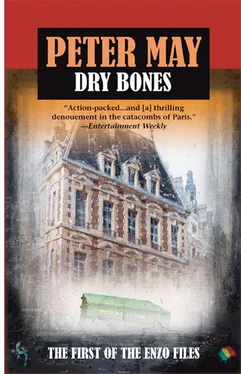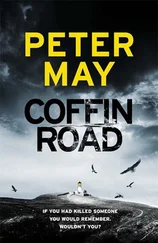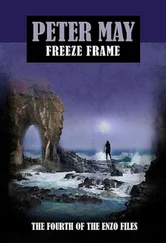‘We don’t need charity.’
‘Of course you don’t. But I do need Nicole. Even after just one day, I realise how difficult this project would be without her. Here, let me refill your glass….’
The big farmer hesitated for a moment, then sat down again, reluctantly, and held out his glass. Enzo filled it liberally, and the two men drank in silence for several minutes.
‘It’s hard being a father,’ Enzo said finally.
‘That’s true,’ Lafeuille agreed. ‘What’s your girl’s name?’
‘Sophie.’
‘Where’s her mother?’
‘She’s dead.’
Lafeuille looked at him, reappraisal in his eyes. ‘You raised her yourself?’ Enzo nodded. ‘ Mon dieu , I could never have raised Nicole without her mother.’
Enzo shrugged. ‘You learn how. Sometimes the hard way.’ And a slight smile flickered briefly in his eyes. ‘She was about twelve years old,’ he said, ‘getting ready for school one morning, and her face was all flushed and pink. She told me she had cramps and felt sick. And I thought, oh my God, she’s starting her period. I guess that’s the sort of thing mothers usually deal with.’
Lafeuille chuckled. ‘Not if you grow up on a farm. You know about these things before you can walk.’
Enzo grinned. ‘Aye, well, it’s different for us townies.’
‘So what did you do?’
‘I sat her down and started to explain it to her in terms I thought she might understand. Nothing too explicit. And she listened and nodded solemnly as I talked round and round the houses. And when, eventually, I’d finished, she said, “Are you talking about menstruation? Because I started my periods last year.”’
Lafeuille laughed and his nose began bleeding again. He dabbed at it with the gauze. ‘ Putain ! That’s priceless!’
And so they sat and drank whisky until the bottle was finished, talking about their girls. And when the first light appeared in the sky, Lafeuille got unsteadily to his feet. ‘I’ve got to get back and milk the cows.’
‘You can’t drive in that state.’
‘I’ve driven in worse. Anyway, there’s no one on the roads at this hour. It’s just myself I’ll kill.’
‘Let me at least make you a coffee.’
Reluctantly, Pierre Lafeuille stayed another half-an-hour while Enzo poured hot, black coffee into him and tried to sober him up. Finally, there was no keeping him any longer. Enzo walked him down into the square. The sky was a pale yellow glow in the east, but the town was still asleep. Lafeuille shook his hand. ‘It’s been a privilege, Monsieur Macleod.’
‘It’s been an experience, Monsieur Lafeuille.’
Lafeuille grinned and got into his battered Deux Chevaux . It coughed unhealthily as he turned the key, but roared into life and the sound of it echoed around the square. Enzo watched as it weaved away down the Rue Georges Clemenceau towards the church of St. Urcisse. It would be a long hundred kilometers.
Outside, the town was starting to come alive. He heard the street sweepers and the bin men, the growling motor of the machine that washed down the pavements, great circular brushes spinning along the gutters. He heard boulangers ’ vans heading off on their first deliveries, and the smell of fresh bread wafted warm and yeasty on the cool morning air. Commerçants were arriving to open up cafés and bars, the first cars were laying claim to their parking places in the square, and rising above it all, the frenetic chatter of birds concealed among the leaves of the plane trees.
Enzo leaned on the rail at the open French windows and looked down into the square. The sun was beginning to squint over rooftops to the east. His head was pounding, and his face was sore. The smell of coffee came to him now, and cigarette smoke, and he turned back into the séjour . The moment when he might have gone back to bed had come and gone. Sleep had seemed unlikely in the aftermath of an eventful night, and the Ordre de la Libération had begun nagging at him again. He gazed thoughtfully at the board, and the name of Edouard Méric, which he had written up beside the photograph of the medal. And he remembered Nicole complaining that although she had been able to get back to the main website from Méric’s biography page, there didn’t seem to be a link to it from the site itself. Or to any of the other biographies, which surely existed.
He sat down at the computer and hit the space bar. The screen lit up. At least one of them had enjoyed a good sleep. He found the home page of the Ordre de la Libération, and a menu on the left side of the page offered him a link to Les Compagnons de la Libération . He clicked on it, and a fifteen page document downloaded and opened up on his screen. It consisted of three columns. The left-hand column listed the forenames of the medal’s one thousand and thirty-eight recipients. The middle column gave their surnames, and the right-hand column the date when the medal was awarded. But the list was alphabetical, rather than chronological. So Enzo asked his computer to search for the date 12/05/43 . A message came up which read, No occurrences were found in the document . His heart sank. Another dead-end. Then he realised that the dates in the right-hand column gave the year in full. So he made another search, this time asking for 12/05/1943 . Up came the name André Mounier . Enzo was getting excited. He was given the option to search again. He took it. And another name appeared. Philippe Roques . He searched again. There were no further names. So, both André Mounier and Philippe Roques had been awarded the Ordre de la Libération on the same day — May 12th, 1943.
Enzo returned to the home page and found what Nicole had missed the previous day — a sub-list of links under Les Compagnons de la Libération which led to individual biographies. He clicked on it. A long page listed all the names in alphabetic groupings. Enzo selected the letter M and immediately jumped to the list of names starting with that letter. There were dozens of them. He searched through them several times, with a growing sense of frustration. For some reason André Mounier did not appear on the list. He returned to Google and asked it to search the internet for André Mounier and Ordre de la Libération in the same sweep. They came up together at the top of a very short list, and the link took Enzo to an empty biography page on the website of the Ordre. A message told him that this biography was currently unavailable.
He cursed his bad luck and went back to the page with the list of alphabetic groupings, and hit the letter R. There were six lines of names. Philippe Roques appeared in the middle of the fourth line. He clicked on the name, and Roques’ biography materialised in front of him, along with a photograph. Roques had an old-fashioned, square-jawed face with neatly parted dark hair and round, tortoiseshell glasses. He had the faintest smile on his face, gazing off to camera left, lights reflecting in both eyes. He looked like an intelligent man, and his biography confirmed that impression.
Born in Paris in 1910, Roques studied political science before going on to become a parliamentary correspondent. He was called up as a reservist in 1939, then spoke out fiercely against Pétain and the Vichy government after the armistice, going on the run to try to establish contact with the Free French. He was successfully involved in the creation of resistance networks in the Cantal, and eventually airlifted out to London where de Gaulle entrusted him with an important mission. He was to return to France and hand-deliver letters to key political figures. He succeeded in his mission, and after helping to establish the National Council of Resistance, was called back to London. His plane, however, was unable to land, and he was forced to take the circuitous route to England via Spain. Which was when disaster struck.
Читать дальше












